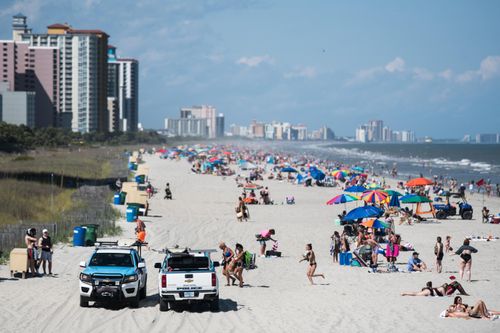37 million people are expected to travel this Memorial Day weekend

As America reopens, more than 37 million people are expected to travel for the Memorial Day holiday weekend — a big boost from last year’s record low.
That number of people expected to travel 50 miles or more from home is a 60% increase from last year when only 23 million traveled, according to a AAA Memorial Day travel forecast published Tuesday. The 23 million figure from 2020 is the lowest recorded since AAA began tracking in 2000, the report said.
“As more people get the COVID-19 vaccine and consumer confidence grows, Americans are demonstrating a strong desire to travel this Memorial Day,” Paula Twidale, the senior vice president for AAA Travel, said in a statement.
“There are a lot of people who’ve been putting off traveling until they are fully vaccinated,” said CNN Medical Analyst Dr. Leana Wen, an emergency physician and visiting professor of health policy and management at the George Washington University Milken Institute School of Public Health.
Almost 50% of all Americans have received at least one dose of a Covid-19 vaccine. “I think people feel a lot more comfortable with traveling,” Wen said. “The rates of community transmission are also coming down. That’s adding to people’s perception of a more normal environment.”
Most travelers are driving
Most of the Memorial Day weekend travelers — 34 million — are expected to get on the road again rather than fly, marking a 52% increase in car travel over last year. Top Memorial Day road trip destinations this year include Las Vegas; Orlando; Myrtle Beach, South Carolina; Denver; and Nashville, the report said.
AAA’s report defined the Memorial Day weekend as Thursday through Monday.
Gas is expected to be at its highest price since 2014, although AAA doesn’t anticipate high gas prices to affect travel demand.
While air travel will still be lower than 2019, the 2.5 million expected fliers represent a 577% increase from last year. Recent TSA figures also point to a strong summer for air travel: On Sunday, the TSA screened 1.71 million people, a new pandemic-era air travel record.
AAA’s Twidale said the expected rebound in Memorial Day travel this year is “a strong indicator for summer.”
“Last year, at this time, we were talking about safety over Memorial Day and warning people not to travel,” Wen said. “It’s really remarkable that it’s a year later, and the advice that I’m giving now is going to be totally different. … People can travel; they can do so safely once they’re fully vaccinated. And I’m so excited to be able to encourage individuals to be getting together with their loved ones once again.”
Travel risk and vaccination status
The anticipated increase in holiday weekend travelers still represents 13% — or nearly six million — fewer travelers than in 2019. This decrease — and a continued tendency to choose road trips over air travel — could indicate that while some people are excited about reopening and are confident in Covid-19 vaccines, they are still aware of the remaining pandemic risks.
“There are many families that have mixed vaccination status, like mine, where the parents are vaccinated but the children are not,” Wen said.
For various reasons, “there are also some families where the adults are not vaccinated yet,” Wen added. “In many parts of the country, this is still a dangerous time for people who are not yet vaccinated.”
So “we must all remember to continue taking important safety precautions,” said AAA’s Twidale.
The US Centers for Disease Control and Prevention has recommended that unvaccinated people delay travel until they are vaccinated. Unvaccinated people who decide to travel, however, should take measures including getting tested before and after travel, and staying at least 6 feet away from people who don’t live in the same household. All travelers, regardless of vaccination status, should wear masks on public transportation and in terminals.
There are multiple ways to reduce Covid-19 risk while road-tripping, flying, staying in a hotel, going to the beach, visiting family indoors or eating at restaurants.
Complications to consider
As Memorial Day gets closer, the actual number of holiday travelers could change, the AAA report said — especially if Covid-19 cases surge. A destination’s case number is one thing people should look into before hitting the road, Wen said.
While traveler numbers still aren’t as high as they were pre-pandemic, vacationers should anticipate travel delays or congestion and plan accordingly, the report suggested.
“Afternoon congestion is nearly back to pre-pandemic levels,” said Bob Pishue, a transportation analyst for INRIX, a connected car services and transportation analytics company, in a news release. “Travelers should anticipate delays to start on Wednesday and continue through Memorial Day. Our advice to drivers is to avoid the evening commute times and plan alternate routes.”